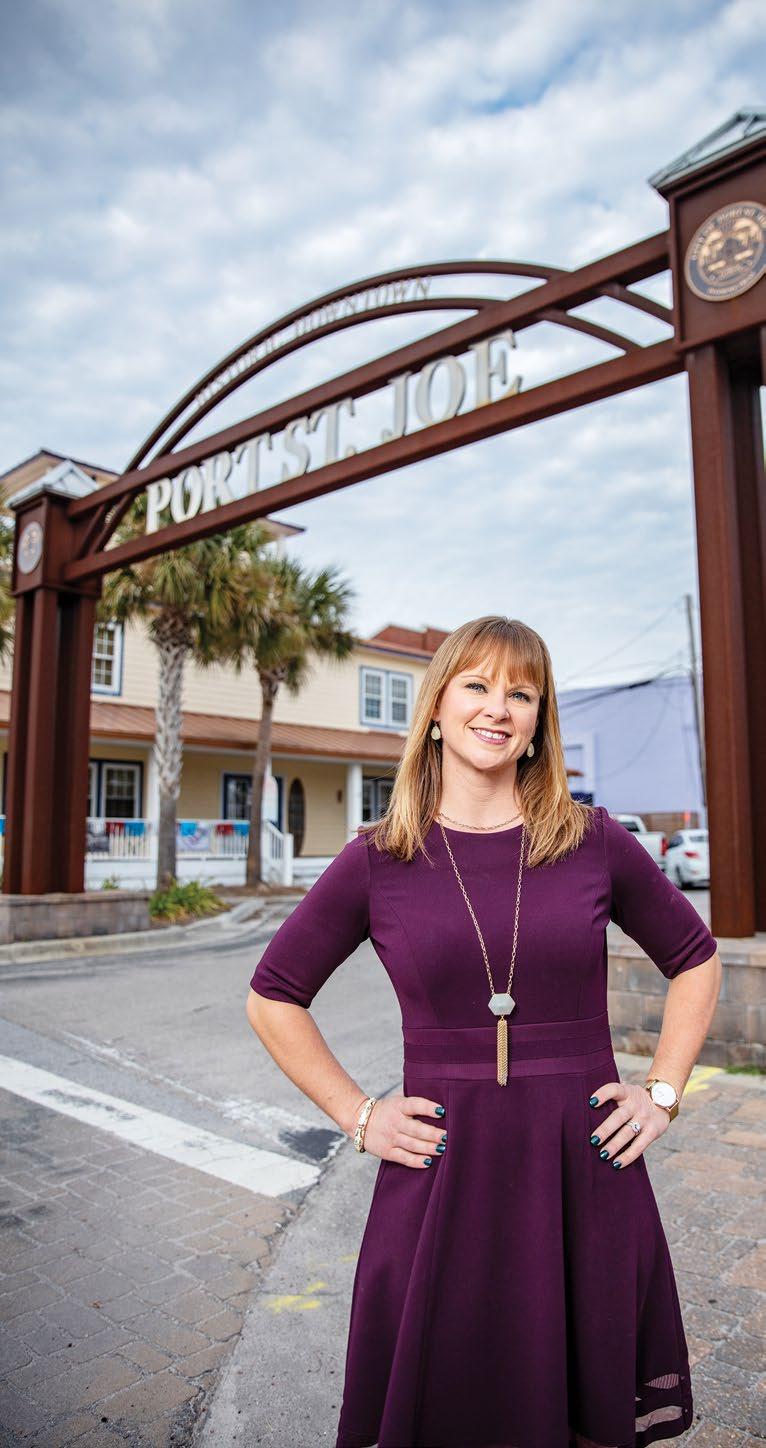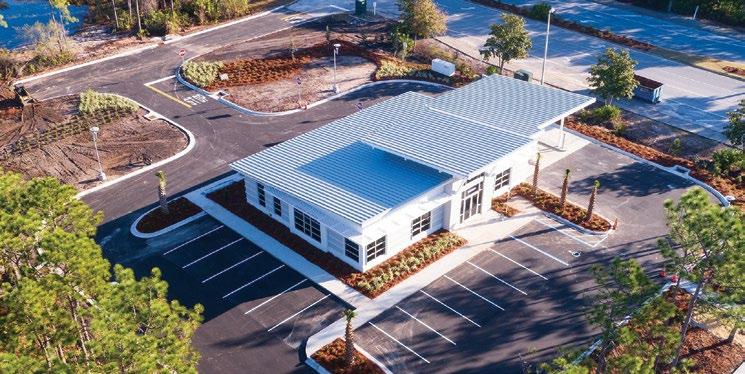
13 minute read
Pensacola businessman and philanthropist Quint Studer
ADAPTABLE VISIONARY
When the world slowed down, Quint Studer sought to strengthen emotional connections
BY STEVE BORNHOFT
Quint Studer is a community steward.
And a visionary, entrepreneurial businessman who is good about sharing what he knows.
To all that he does, he applies a knack for breaking down seemingly complex challenges, believing that there is a lot you can do if you “just reduce an issue to its essence.” He’s a great bullet-list maker.
A Wisconsin native, he presents solutions to problems — with a voice that would not be out of place exiting a beer truck driver in Milwaukee — in a manner that is easily understood and retained. As a teacher — Studer is the entrepreneur-inresidence at the University of West Florida — he employs lots of anecdotes. Engage him in conversation for a time, and you are sure to come away with stories you will want to share with others.
Of late, Studer has developed a 1-10 scale, patterned after the pain level scales given to hospital patients, that businesses may use in determining whether and to what extent they are experiencing stress or, worse, trauma.
For Studer, trauma is more than extreme stress. It’s a different animal. Stress, he said, tends to be short-term. A person, business or organization may ride it out and snap back, achieving a return to normalcy. In cases of trauma, “normalcy” may not be recoverable. Roles may have changed irretrievably. Jobs may have been lost permanently. Market niches may have evaporated.
Consider university faculty, Studer suggested.
“Their students don’t report to classrooms like they used to,” Studer said in December. “Instruction is virtual and involves new technology. Enrollment is declining and school revenue is going down. They don’t know when things may go back to normal. Hopelessness is creeping in. It’s almost a definition of trauma.”
Locating an entity’s or a person’s position on a stresstrauma continuum is important, Studer said, “because if you don’t assess a problem correctly, you can’t treat it correctly.”
In Studer’s book, Building a Vibrant Community, published in 2018, he identified keys to creating a thriving downtown: a program of events that lead people to visit central business districts; restaurants and retail establishments; commercial real estate; and residential developments.
The COVID-19 pandemic has had impacts on all four of those areas. On his 1-10 scale, with 1 being minimal stress and 10 being trauma of crisis proportions, Studer said downtowns are “probably an 8.”
“Most downtowns are filled with locally owned businesses without the deep pockets of a franchise organization,” Studer noted. “Franchise restaurants tend to be on major thoroughfares, and most of them have drive-thrus. If you’re on busy streets, you can probably handle the COVID pandemic a little better.”
To the extent that the pandemic has canceled events and diminished foot traffic, downtown businesses have suffered.
“Retail is really taking a hit,” Studer said. “People are getting in the habit of ordering everything online. I read an interview in the Wall Street Journal with a man who, since COVID, has not gone to a grocery store. Everything he has purchased, he got online.” Or may have had delivered.
Threatened by online shopping when it was new, retailers responded by improving customer service and the shopping experience.
The Busy Leader’s Handbook: How to Lead People and Places That Thrive — Being a great leader means getting the fundamentals right. It also means consistently doing the “little things” that make a positive difference in the lives of employees, customers and other stakeholders. The Busy Leader’s Handbook: How to Lead People and Places That Thrive is a practical, easy-to-use book filled with gentle reminders of what we should be doing every day — especially when work is at its most intense. Businessman, entrepreneur, philanthropist, author and teacher Quint Studer says it’s important for businesses dealing with pandemic-induced downturns to maintain relationships with customers by reaching out and shoring up “emotional bank accounts.” That may be especially important for hard-hit retailers that rely on foot traffic in their battles with online merchants.
PHOTO COURTESY OF QUINT STUDER
“But online players have gotten pretty good with experience,” Studer said. “When I order something online, the receipt of my order is confirmed, a tracking number is assigned, they tell me when I can expect delivery and they update the progress of my package along the way to my door. Retailers are going to have to elevate their game again.”
The emotional toll, too, has been greater on locally owned small businesses than franchise operations, Studer suggested.
“It’s a lot easier for someone to lay off employees when he is not used to seeing them and doesn’t know their families and is sitting in a corporate headquarters somewhere,” Studer pointed out. “When you’re downtown and you’re running a small business, my gosh, you know these families. You know the kids. You can’t say it’s not up to me. Emotionally, it’s extremely, extremely hard for some of these business owners.”
Studer is confident that downtowns will rebound, “but the question for the individual business owner is whether they can last long enough to be part of the comeback.” It’s hard to know.
“I think businesses are closing down because even though owners have cut back on staffing and are working their businesses themselves all the time, they get to the point where they run out of cash and can’t pay the rent anymore,” Studer observed.
The pandemic has reminded businesses that they need to be able as circumstances dictate to quickly pivot and change their business model. Such preparedness may require investments in technology so that a retailer, for example, can shift from in-store to online sales.
Always, Studer said, businesses should make it a point to maintain contact with customers.
“The Blue Wahoos did not have a season in 2020,” said Studer, who is the majority owner of Pensacola’s Double-A minor league baseball team. “But we have season ticket holders and have tried to come up with regular ways to communicate with them — if you don’t stay in front of your customer, they forget about you. You can’t afford to disappear in a hole.”
Studer further recommends that businesses connect with employees and customers by “building their emotional bank accounts.”
He offered an example.
“At the Studer Family of Companies and the Studer Community Institute, we deal with maybe 10 banks. I got a holiday gift basket delivered to my house by Hancock Whitney Bank, and every item in it was from a local store. That took a lot of work. They could have gone to an outside vendor and just ordered something.
“Today, I am feeling very good about Hancock Bank. If somebody came to me today and tried to talk me out of my relationship with them, I wouldn’t budge. They built up their emotional bank account with me.”
For multiple reasons, Studer encourages people to patronize locally owned businesses.
“When I first got into baseball,” he said, “I visited some companies whose market leader was local. I would try to sell them a $1,500 sponsorship, and they would say to me, ‘Quint, I’ve got to go to corporate to get permission,’ whereas you can go to a local business owner and he’ll turn that thing around. Plus, his accountant is local, his attorney is local.”
The pandemic has ushered in lifestyle and workstyle changes that to an unknown extent will remain permanent. The lessors of commercial real estate and residential units will need to adjust accordingly, but downtown, Studer is confident, will retain its appeal.
“People still want to live downtown.” He said. “They want to walk and ride a bicycle instead of sitting in traffic. The hottest market is downtown real estate.”
But floor plan preferences have rapidly changed.
Studer found that when he developed the Southtowne and Savoy Place apartments in Pensacola, units with two bathrooms and two bedrooms were initially the most popular. Versus each renting a studio apartment, roommates could save money by renting a twobedroom unit and splitting the rent.
“But with COVID, everyone wants to live alone in a unit with one bedroom and one bath,” Studer said. “They are willing to pay an extra few hundred dollars for health security and safety.”
Owners of commercial office space, Studer said, will have to work creatively with their tenants and be prepared to accept less rent per square foot. The pandemic has dampened enthusiasm for co-work spaces, in particular.
“It’s no longer sexy to sit at a big table with everyone,” Studer said.

A favorable climate and the opportunity to dine outdoors have minimized to a degree the impact of the pandemic on Pensacola versus downtowns farther north.
Though I walk through the valley
Studer described a challenging stage in the life cycle of a business and then applied it to the nation as a whole.
“In business, you start a business and you’re excited and then, all of a sudden, you realizethat it’s going to be harder than you thought,” Studer said. “You hit that valley of despair.
“Our country has been in a valley of despair with COVID. It’s going to be a while, but didn’t we all feel a little bit better with the arrival of vaccines? I watched a nurse get a vaccine at a hospital in New York, and somehow I felt better. We will come out of this, but that doesn’t mean people are going to go back to their old habits. Old habits are called old habits because they’re old. New habits — shopping online, eating in more, working virtually — they will hurt the local economy.”
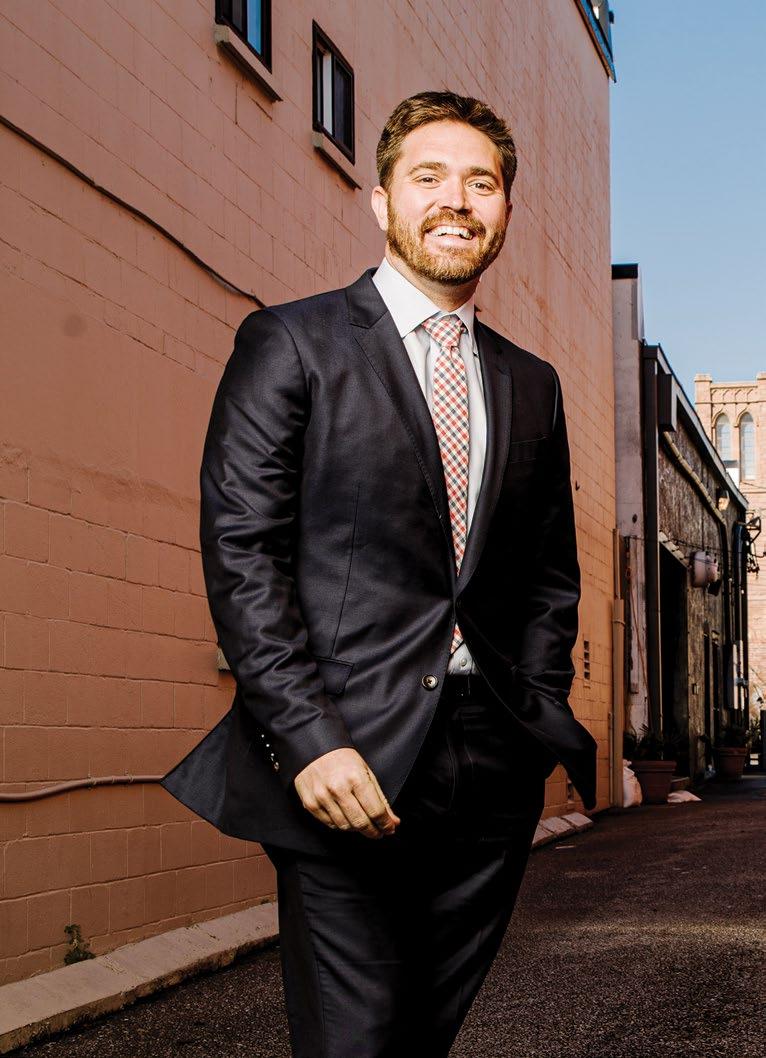
Undeterred, the Studer Community Institute (SCI), a nonprofit dedicated to “improving the quality of life for everyone in our community, creating a vibrant place to live, work and play,” is focused in three areas, Studer said.
Early development
The institute is working to ensure that all new mothers in Escambia County see a tutorial on early brain development before they leave the hospital. At this writing, about 60% of moms are viewing the video.
In addition, Studer encourages new mothers to sign up for the Boston Basics program provided by Harvard University. That program, for $6 a month, provides parents with regular updates via text messages that list behaviors and skills that a child should be exhibiting at a given age.
“The tutorial and the text messages are key,” Studer said. “We’re turning the dial on building child’s brains. If I had a billion dollars to spend, I’d use it to expand throughout the country what we’re doing in Escambia County.”
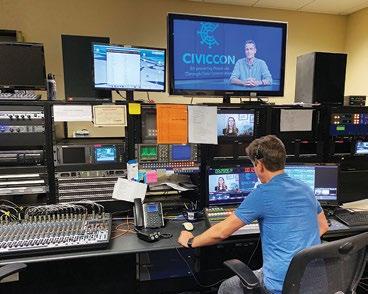
As chief of staff for Quint Studer at the Studer Family of Companies, D.C. Reeves coordinates activities including CivicCon, which stimulates conversation about community issues — even when it has to be conducted virtually.
Raising the civic IQ
In 2017, SCI and the Pensacola News Journal combined to launch CivicCon, a series of speaker events designed to bring about an informed public engaged in community conversation.
As of the end of 2020, 37 CivicCon events had been held, addressing topics that included fiscal responsibility, social equity and diversity, historic preservation and the benefits of a walkable and bicycle-friendly community.
Livestream audiences in the latter half of 2020 averaged more than 12,000 views per event.
Due to the pandemic in 2020, only one event was held at a public venue. All the other events were on virtual platforms.
“When we did our events in person, the strongest Republican and the strongest Democrat would sit next to each other and agree on parking, walkability or the importance of quality education,” Studer said. “Our pie is only so big, and we’re all in this together.”
An informed public benefits the official who is making good decisions, Studer said, because it understands and supports the basis for the action.
“And the politician who may not be making the right decision is challenged by a community that asks good questions: Why are we adding traffic? Why aren’t we shrinking our lanes and adding more amenities where people live?”
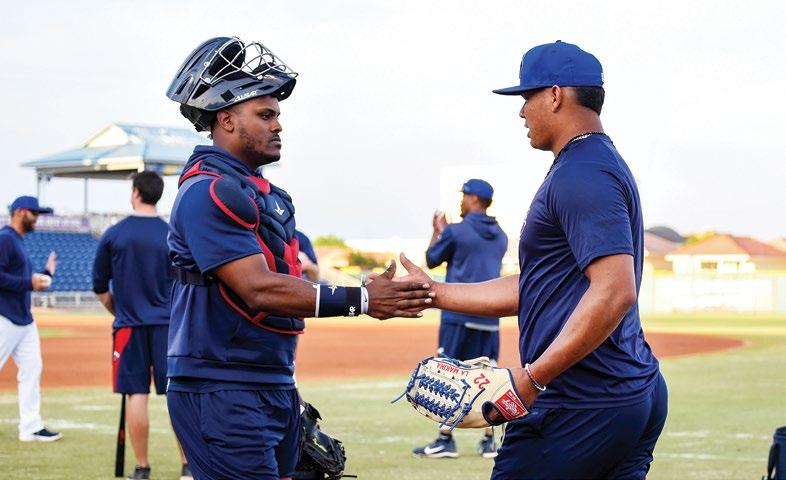
The Pensacola Blue Wahoos, recently affiliated with the Minnesota Twins, are now part of the Miami Marlins organization. Majority owner Quint Studer says that the Wahoos and Marlins share a commitment to diversity.
Economic development
The strengthening of local businesses, for Studer, is the foundation of economic development.
“It’s not all shovel-ready land and incentives,” Studer said. “Those are questionable at times. They can be good, but they can be bad. We want to help businesses develop the skills they need to be successful. Business owners don’t lack passion, but many have not had the experience of running a company. They have never hired anyone, so the first person they hire is their cousin, and it’s a bad hire. They don’t know how to withhold the right amount of taxes or how to negotiate a lease.”
EntreCon, SCI’s annual skill-building business and leadership conference, has helped hundreds of businesses that are quietly adding jobs without ribbon-cuttings or other fanfare.
“If you add up the jobs that result from growing your own, it far surpasses the jobs that come from bringing someone in from the outside,” Studer said.
Marlins affiliate
Owing to the consolidation and reorganization of the minor leagues by Major League Baseball, the Wahoos are newly an affiliate of the Miami Marlins, whose owners include club CEO Derek Jeter and basketball great Michael Jordan. Don Mattingly manages the team.
Studer said he will miss the relationship that the Wahoos had with the Minnesota Twins, but looks forward to working with the Marlins whom he sees as a good fit for the Wahoos in terms of company culture.
“We are very much into diversity and inclusion, and the Marlins were the first major league team to hire a woman (Kim Ng) as their general manager,” Studer noted.
Too, Wahoos co-owner and professional golfer Bubba Watson is an admirer of Mattingly.
“In 2016, the Wahoos won the Bob Frietas award as the best Double-A team, and we had Bubba, go to baseball’s winter meetings to accept the award,” Studer recalled. “Mattingly is a lefty like Bubba, and Bubba’s father all but wanted his son to be Don Mattingly.
“It was the year that the Cubs had won the World Series, and Cubs president Theo Epstein was on the stage with Bubba and other minor league owners who were there to receive awards. Arrangements had been made for Bubba to spend some time with Mattingly, and he had been excited to meet him. Then, when Epstein was called to the microphone, the first thing he said was howthrilled he was to be sitting with twotime Masters champion Bubba Watson.”
Watson, said Studer, has done a good job giving the Wahoos a national presence.
Studer anticipates that the start of the 2021 minor league season will be delayed to May or early June.
“But you have to prepare like it is going to start on schedule,” Studer said.
Preparation. Recall that it’s one of Studer’s keys to success.
Might Studer have advice for even the likes of Jordan and Jeter about how to lead a major league ball club?
All they need do is ask.
Stress vs. Trauma
Qualities of Stress
Stress is a feeling of emotional or physical tension. It can come from any event or thought that makes you feel frustrated, angry or nervous.
Stress is your body’s reaction to a challenge or demand. In short bursts, stress can be positive, such as when it helps you avoid danger or meet a deadline. But when stress lasts for a long time, it may harm your health.
Many times, people don’t know how to handle stress, so it worsens.
Stress may be life-changing.
Qualities of Organizational Trauma
Breaking down of communication
Breaking down of trust
Diminished productivity
Workers feel powerless
Workers feel hopeless
Shake up in roles and responsibilities
Sense of loss
Source: Studer Community Institute





